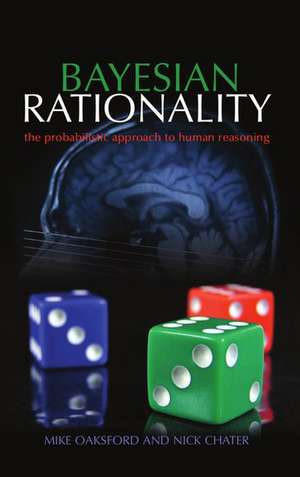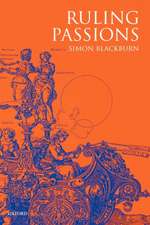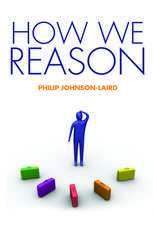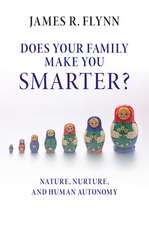Bayesian Rationality: The probabilistic approach to human reasoning: Oxford Cognitive Science Series
Autor Mike Oaksford, Nick Chateren Limba Engleză Hardback – 22 feb 2007
| Toate formatele și edițiile | Preț | Express |
|---|---|---|
| Paperback (1) | 546.08 lei 31-37 zile | |
| OUP OXFORD – 22 feb 2007 | 546.08 lei 31-37 zile | |
| Hardback (1) | 673.85 lei 31-37 zile | |
| OUP OXFORD – 22 feb 2007 | 673.85 lei 31-37 zile |
Preț: 673.85 lei
Preț vechi: 974.21 lei
-31% Nou
Puncte Express: 1011
Preț estimativ în valută:
128.96€ • 133.61$ • 107.62£
128.96€ • 133.61$ • 107.62£
Carte tipărită la comandă
Livrare economică 11-17 martie
Preluare comenzi: 021 569.72.76
Specificații
ISBN-13: 9780198524502
ISBN-10: 0198524501
Pagini: 352
Ilustrații: 24 figures
Dimensiuni: 162 x 239 x 24 mm
Greutate: 0.65 kg
Editura: OUP OXFORD
Colecția OUP Oxford
Seria Oxford Cognitive Science Series
Locul publicării:Oxford, United Kingdom
ISBN-10: 0198524501
Pagini: 352
Ilustrații: 24 figures
Dimensiuni: 162 x 239 x 24 mm
Greutate: 0.65 kg
Editura: OUP OXFORD
Colecția OUP Oxford
Seria Oxford Cognitive Science Series
Locul publicării:Oxford, United Kingdom
Recenzii
This fascinating book is the capstone of one of the most important and original programs of research on reasoning in the last twenty years. Oaksford and Chater argue persuasively that human thinking is best understood not in terms of how poorly it approximates the philosopher's norms of deductive logic, but rather in terms of how well it captures the more powerful and subtle principles of Bayesian probability.
For years, Oaksford and Chater have taken a maverick approach to the analysis of human reasoning, applying probabilistic ideas to construct radically new interpretations of what people are doing when they reason and whether or not those actions are rational. The field has started to follow Oaksford and Chater's lead; probabilistic concepts are becoming central to all areas of cognitive science. In this book, Oaksford and Chater offer an exceptionally lucid and compelling introduction to their own work and in the process provide an accessible introduction to a number of technical issues in reasoning. This book is a must for those interested in the latest theoretical ideas in the study of human reasoning.
Oaksford and Chater have been at the center of a major reconceptualization of how humans reason. This book explains the deep reasons for this new approach and provides an excellent summary of their work.
Oaksford and Chater convincingly argue that rationality in the real world cannot be reduced to logical thinking and demonstrate how apparently logical problems can instead be reconstructed in a probabilistic way. This is an important step towards the ultimate goal of understanding the heuristic mechanisms underlying behavior. An excellent book on a Bayesian approach to cognition.
For years, Oaksford and Chater have taken a maverick approach to the analysis of human reasoning, applying probabilistic ideas to construct radically new interpretations of what people are doing when they reason and whether or not those actions are rational. The field has started to follow Oaksford and Chater's lead; probabilistic concepts are becoming central to all areas of cognitive science. In this book, Oaksford and Chater offer an exceptionally lucid and compelling introduction to their own work and in the process provide an accessible introduction to a number of technical issues in reasoning. This book is a must for those interested in the latest theoretical ideas in the study of human reasoning.
Oaksford and Chater have been at the center of a major reconceptualization of how humans reason. This book explains the deep reasons for this new approach and provides an excellent summary of their work.
Oaksford and Chater convincingly argue that rationality in the real world cannot be reduced to logical thinking and demonstrate how apparently logical problems can instead be reconstructed in a probabilistic way. This is an important step towards the ultimate goal of understanding the heuristic mechanisms underlying behavior. An excellent book on a Bayesian approach to cognition.
Notă biografică
Mike Oaksford is Professor of Psychology and Head of School at Birkbeck College London. He was a research fellow at the Centre for Cognitive Science, University of Edinburgh, he was then lecturer at the University of Wales, Bangor, and senior lecturer at the University of Warwick, before moving to Cardiff University in 1996 as Professor of Experimental Psychology, a post he held until 2005. His research interests are in the area of human reasoning and decision making. In particular, with his colleague Nick Chater, he has been developing a Bayesian probabilistic approach to deductive reasoning tasks. According to this approach reasoning "biases " are the result of applying the wrong normative model and failing to take account of people's normal environment. He also studies the way the emotions affect and interact with reasoning and decision making processes.Nick Chater is Professor of Cognitive and Decision Sciences at University College London. He has an M.A. in Psychology from Cambridge University, and a PhD in Cognitive Science from Edinburgh. He has held academic appointments at Edinburgh, Oxford, and Warwick Universities. His research focussed on attempting to find general principles that may be applicable across many cognitive domains, ranging from reasoning and decision making, to language acquisition and processing, to perception and categorization. Since the late 1980s, in collaboration with Mike Oaksford, he has been interested in the application of probabilistic and information-theoretic methods for understanding human reasoning.






















